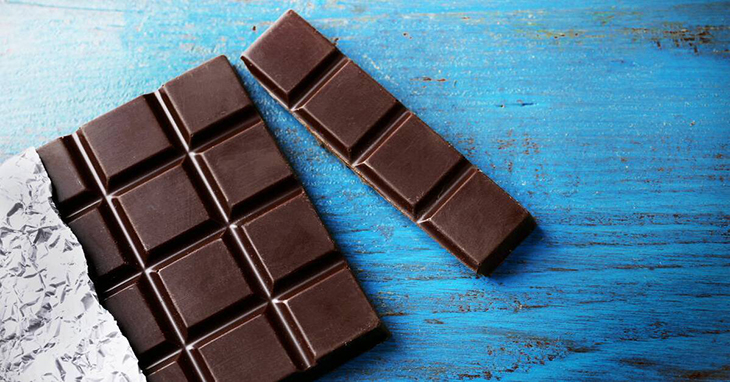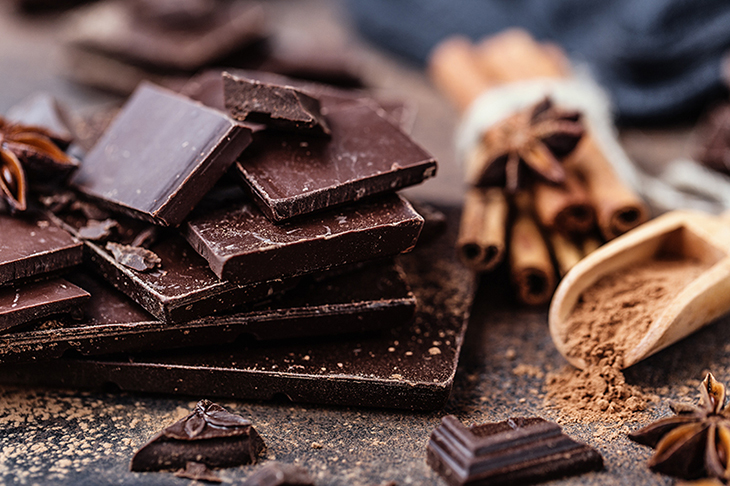
If you have been searching for positive reasons to eat chocolate every day of your life, then look no further. This article will talk about why dark chocolate – not milk or white though – are actually quite good for your health. Aside from being rich in antioxidants, dark chocolate is also packed with nutrients, which is why they actually make a pretty good snack.
According to research published back in 2016 in the Journal of Nutritional Science, dark chocolate actually contains phytonutrients called flavonoids. These plant chemicals work as antioxidants, and even play a role in helping prevent cancer risk while benefiting the heart health. Chocolate is derived from the cocoa plant, and contains theobromine, a compound that could help lessen inflammation and even lower blood pressure.
According to author and Registered dietician, Toby Amidor, RD, “Cacao is packed with numerous antioxidants – actually more than green tea or red wine. The darker you go, the more antioxidants you’ll get, but there needs to be a balance eating palatable dark chocolate and getting the health benefits.”
According to the Harvard T.H. Chan School of Public Health, the best dark chocolate bar to choose should have at least 70 percent cacao or more. Chocolate bars that have lower percentages of cacao tend to have more unhealthy fats and added sugar. But don’t think that you can have all the chocolate you want. It’s still high in saturated fat and calories, which is why Amidor recommends only having 1 ounce or less of dark chocolate a day.
Here at 8 Benefits of Eating Dark Chocolate
- It Can Help Prevent Memory Loss, Improve Cognition, and Boost Your Mood
A number of studies show that eating dark chocolate with high cacao percentages can possibly benefit the brain. Research shows that chocolate stimulates the neural activity in areas of the brain that are linked with pleasure and reward. When this happens, stress decreases and moods tend to improve, says Joy DuBost, PhD, RD, who is the owner of Dubost Food and Nutrition Solutions in Arlington, VA.
In addition, a number of studies also show how chocolate impacts the brain. One study showed that eating 48 grams of 70 percent cacao organic chocolate increased neuroplasticity, which is the brain’s ability to create new synaptic connections. As a result, there are positive effects on mood, memory, and cognition. Meanwhile, another study also showed how memory and learning can be enhanced with chocolate consumption. While another study posted in Depression & Anxiety found a link between reduced risk of clinical depression and consumption of dark chocolate.
While these are all exciting findings, it is still important to understand that more research with larger groups must be conducted first to truly understand these links.
- It Can Be Good For Your Skin
According to the Harvard T.H. Chan School of Public Health, dark chocolate contains a list of vitamins and minerals, such as manganese, copper and iron, just to name a few, all of which are all beneficial for the skin. Manganese actually supports collagen production, which is a protein that assists in keeping the skin looking healthy and young. In addition, other studies found high levels of antioxidants that can possibly help protect the skin from the ultraviolent rays that are emitted by the sun. But as always, more research is needed to support these claims.
- It’s Good for Your Gut and Could Aid in Weight Loss
Although this sounds counterproductive, some research shows that eating dark chocolate could actually help control in appetite control, which in turn helps weight loss. Neuroscientist Will Clower, PhD, who wrote a book called Eat Chocolate, Lose Weight, talks about how eating a bit of dark chocolate before or after a meal can actually trigger hormones which tell the brain that it’s full.
Former research also found how during digestion, chocolate tends to work like a prebiotic, which is type of fiber that encourages beneficial bacteria to grow in the gut. It explains that the more “good” microbes you have in your system, the better your body is able to absorb the nutrients while supporting a healthy metabolism as well.
Although another study recently published in the Journal of the Federation of American Societies found that even milk chocolate may help in weight loss by curbing appetite and boosting metabolism, but it was a rather small study, which means it would need more evidence with a larger study group, especially since milk chocolate is much higher in sugar and carbohydrate content.
- It Could Possibly Help Prevent Heart and Disease and Lower Risk of Stroke
A systematic review and meta-analysis that was published in the European Journal of Preventive Cardiologyfound that eating chocolate at least once a week was associated with ‘an 8 percent lower risk of blocked arteries,’ which helps to improve heart health. Scientists claim that it’s the flavonoids in the dark chocolate that maintain heart health, which are chemicals that help produce nitric oxide. These cause the blood vessels to relax and lower blood pressure, which lowers the risk of heart disease and strokes.
However, a number of these studies are observational, which means that the results could be unreliable since people don’t always report their proper chocolate intake. But a meta-analysis published in Nutrientsback in July of 2017 showed that regardless of the margin for error, chocolate was likely to be beneficial in reducing the risk of type 2 diabetes, heart health, and stroke.

- It May Improve Blood Sugar Levels and Lessen the Risk of Diabetes Development
Although eating chocolate isn’t exactly the best way to prevent diabetes, some studies show that a healthy amount of dark chocolate with high quantities of cacao could aid in the improvement of the way the body metabolizes glucose, for as long as it’s part of a healthy diet.
A study that was published in the Journal of Community and Hospital Internal Medicine Perspectives in October 2017 showed how the flavonoids in dark chocolate managed to reduce oxidative stress, which scientists believe is the main cause of insulin resistance. Scientists explain that when you improve your body’s sensitivity to insulin, the resistance is also reduced, which lessens the risk of diseases such as diabetes.
Although there are a number of studies that show the benefits of dark chocolate, more studies are needed to truly figure out the relationship between diabetes risk and chocolate consumption.
- It Fights Free Radicals Which May Help in Cancer Prevention
There is evidence that dark chocolate also has properties that could help protect against particular types of cancer, but it’s still limited. Previous research also shows that antioxidants help protect cells from the damage that comes from free radicals, although they are still considered unstable oxygen molecules that are believed to be responsible for aging and disease.
Dr. Dubost explains, “When you have too many free radicals in your body, they start to attack your cells, and that can lead, over time, to low-grade inflammation and to some diseases – cancer, heart disease, and Alzheimer’s.”
The American Cancer Society says that eating a flavonoid-rich diet, which chocolate contains, may help prevent cell damage, which is normally the precursor to a number of cancers. However, most of the research is limited to animals or cell cultures while at the same time, the amount of chocolate reportedly needed to yield the preventive action against cancers is higher than the daily recommended dose for humans.
- It May Send Good Cholesterol Up and Bad Cholesterol Down
A study published in the Journal of the American Heart Association shows how a handful of dark chocolate, almonds and unsweetened cocoa showed a significant drop in the low density lipoproteins (LDL), or “bad cholesterol” of overweight and obese participants.
Meanwhile, according to DuBost, it’s the cocoa butter in the dark chocolate that could be what helps raise the high density lipoproteins (HDL), or “good cholesterol”. Much like olive oil, cocoa butter has oleic acid, a monosaturated fat.
But DuBost also shares that people need to be cautious since more studies are still needed to find out whether chocolate is truly a “cholesterol cure-all.”
- It’s Nutritious and Delicious
Aside from the other seven possible benefits, dark chocolate has a number of nutrients such as fiber, calcium, copper, potassium and magnesium. An overview published in the International Journal of Environmental Research and Public Health also goes on to say that the darker the chocolate, the better.
Again, it’s important to remember that it also has tons of fat and calories, which is why Amidor also reminds people to be very mindful of your daily intake. In addition, she also recommend that before eating any type of chocolate, take a look at the ingredients list to choose the ones with less or more natural ingredients.



